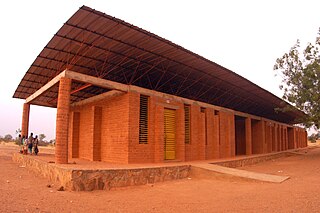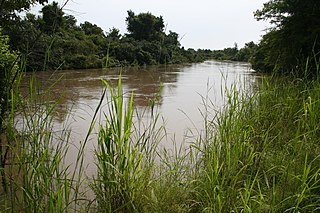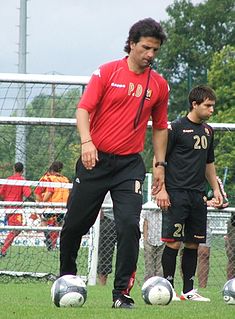| |||||
| Decades: | |||||
|---|---|---|---|---|---|
| See also: | |||||
The following lists events that happened during 2015 in Burkina Faso.
| |||||
| Decades: | |||||
|---|---|---|---|---|---|
| See also: | |||||
The following lists events that happened during 2015 in Burkina Faso.

Burkina Faso is a landlocked country in West Africa. It covers an area of around 274,200 square kilometres (105,900 sq mi) and is surrounded by six countries: Mali to the north; Niger to the east; Benin to the southeast; Togo and Ghana to the south; and Ivory Coast to the southwest. The July 2019 population estimate by the United Nations was 20,321,378. Burkina Faso is a francophone country, with French as the official language of government and business. Roughly 40% of the population speaks the Mossi language. Formerly called the Republic of Upper Volta (1958–1984), the country was renamed "Burkina Faso" on 4 August 1984 by then-President Thomas Sankara. Its citizens are known as Burkinabé. Its capital is Ouagadougou.

The history of Burkina Faso includes the history of various kingdoms within the country, such as the Mossi kingdoms, as well as the later French colonisation of the territory and its independence as the Republic of Upper Volta in 1960.

Blaise Compaoré is a Burkinabé politician who was president of Burkina Faso from 1987 to 2014. He was a top associate of President Thomas Sankara during the 1980s, and in October 1987, he led a coup d'état during which Sankara was killed. Subsequently, he introduced a policy of "rectification", overturning the leftist and Third Worldist policies pursued by Sankara. He won elections in 1991, 1998, 2005, and 2010 in what were considered unfair circumstances. His attempt to amend the constitution to extend his 27-year term caused the 2014 Burkinabé uprising. On 31 October 2014, Compaoré resigned, whereupon he fled to the Ivory Coast.

Education in Burkina Faso is structured in much the same way as in the rest of the world: primary, secondary, and higher education. As of 2008, despite efforts to improve education, the country had the lowest adult literacy rate in the world (25.3%).

The W National Park or W Regional Park is a major national park in West Africa around a meander in the River Niger shaped like the letter W. The park includes areas of the three countries Niger, Benin and Burkina Faso, and is governed by the three governments. Until 2008, the implementation of a regional management was supported by the EU-funded project ECOPAS. The three national parks operate under the name W Transborder Park.

Roch Marc Christian Kaboré is a Burkinabé politician and banker and the President of Burkina Faso, in office since 2015. Previously he served as the Prime Minister of Burkina Faso between 1994 and 1996 and President of the National Assembly of Burkina Faso from 2002 to 2012. He also served as President of the Congress for Democracy and Progress (CDP). In January 2014, he left the ruling CDP and joined a new opposition party, the People's Movement for Progress.

The global spread of H5N1 influenza in birds is considered a significant pandemic threat. While other H5N1 influenza strains are known, they are significantly different from a current, highly pathogenic H5N1 strain on a genetic level, making the global spread of this new strain unprecedented. The H5N1 strain is a fast-mutating, highly pathogenic avian influenza virus (HPAI) found in multiple bird species. It is both epizootic and panzootic. Unless otherwise indicated, "H5N1" in this timeline refers to the recent highly pathogenic strain of H5N1.

H5N2 is a subtype of the species Influenzavirus A. The subtype infects a wide variety of birds, including chickens, ducks, turkeys, falcons, and ostriches. Affected birds usually do not appear ill, and the disease is often mild as avian influenza viral subtypes go. Some variants of the subtype are much more pathogenic than others, and outbreaks of "high-path" H5N2 result in the culling of thousands of birds in poultry farms from time to time. It appears that people who work with birds can be infected by the virus, but suffer hardly any noticeable health effects. Even people exposed to the highly pathogenic H5N2 variety that killed ostrich chicks in South Africa only seem to have developed conjunctivitis, or a perhaps a mild respiratory illness. There is no evidence of human-to-human spread of H5N2. In November 12, 2005 it was reported that a falcon was found to have H5N2.

H7N3 is a subtype of the species Influenza A virus.

The global spread of H5N1 in birds is considered a significant pandemic threat.

Burkina Faso is largely wild bush country with a mixture of grass and small trees in varying proportions. The savanna region is mainly grassland in the rainy season and semi desert during the harmattan period. Fauna, one of the most diverse in West Africa, includes the elephant, hippopotamus, buffalo, monkey, lions, crocodile, giraffe, various types of antelope, and a vast variety of bird and insect life. The country has 147 mammal species, 330 aquatic species including 121 species of fish and 2067 different plant species. Of the plant species, the dominant endemic species are shea tree (Butyrospermum parkii) and the baobab, the former plant species has immense economic value to the country.

Aristide Bancé is a Burkinabé footballer, who plays as a striker for Horoya AC and the Burkina Faso national team.

Paulo Jorge Rebelo Duarte is a Portuguese retired footballer who played as a central defender, and a manager.

Christianity is a minority religion in Burkina Faso. According to The World Factbook in 2019, Christians constitutes approximately 30% of the population, with Catholics representing 23.3% and Protestants 6.5%.. According to official government estimates in 2008 the percentages are lower: 23.2% are Christians. The exact percentages might be hard to accurately predict due to a high degree of Syncretism that occurs in the country between Christians or Muslims and Traditional indigenous beliefs.

Burkina Faso is a religiously diverse society, with Islam being the dominant religion. According to a recent census (2019) conducted by the Government of Burkina Faso, 60.5% of the population adheres to Islam. The vast majority of Muslims in Burkina Faso are Malikite Sunni, deeply influenced by Sufism. The Shi'a branch of Islam also has a small presence in the country. A significant number of Sunni Muslims identify with the Tijaniyah Sufi order. The Government also estimated that 23.2% practices Christianity, 2.7% follow Animism i.e., African traditional religion, 0.6% have other religions, and 0.4% have none.

Burkinabé cuisine, the cuisine of Burkina Faso, is similar to the cuisines in many parts of West Africa, and is based on staple foods of sorghum, millet, rice, fonio, maize, peanuts, potatoes, beans, yams and okra. Rice, maize and millet are the most commonly eaten grains. Grilled meat is common, particularly mutton, goat, beef and fish. Vegetables include, besides yams and potatoes, okra, tomatoes, zucchini, carrots, leeks, onions, beets, pumpkins, cucumbers, cabbage, sorrel and spinach. Although imported products are becoming more common in urban areas, meals in more rural areas typically consist of tô, a sauce of corchorus or baobab leaves, as well as the calyx from Bombax costatum, dried fish, and spices such as chili and soumbala.
The 2011 Burkinabé protests were a series of popular protests in Burkina Faso.

General elections were held in Burkina Faso on 29 November 2015. The elections were the first national elections in the country since the 2014 Burkinabé uprising and the departure of President Blaise Compaoré, who had ruled Burkina Faso for 27 years. The party of former President Compaoré, the Congress for Democracy and Progress, was banned from running a presidential candidate but was still able to participate in the parliamentary election.
{{short description|2015 outbreak of avian In 2015, an outbreak of avian influenza subtype H5N2 was identified in a series of chicken and turkey farming operations in the Midwestern region of the United States. As of May 30, more than 43 million birds in 15 states had been destroyed as a result of the outbreak, including nearly 30 million in Iowa alone, the nation's largest egg producer. In the Midwestern U.S., the average price of eggs had increased 120% between April 22 and May 30. The effects however were seen nationwide, with prices in California up 71% in the same timeframe.

Burkina Faso–India relations refers to the international relations that exist between Burkina Faso and India. Burkina Faso maintains an embassy in New Delhi. India maintained an embassy in Ouagadougou from November 1996 until its closure in July 2002. Currently, India maintains an honorary consulate in Ouagadougou, which functions under the jurisdiction of the High Commission of India in Accra, Ghana.
| This Burkina Faso-related article is a stub. You can help Wikipedia by expanding it. |
| This year in Africa article is a stub. You can help Wikipedia by expanding it. |